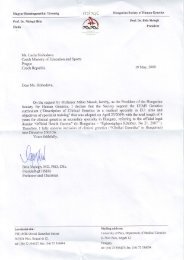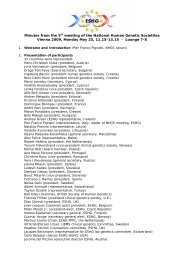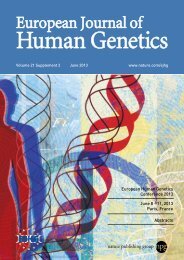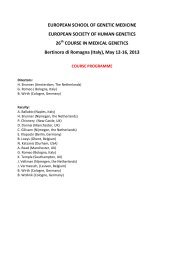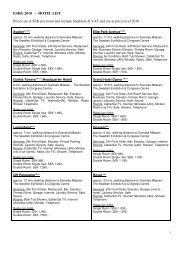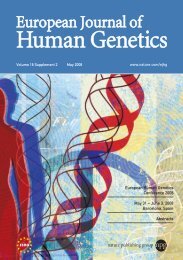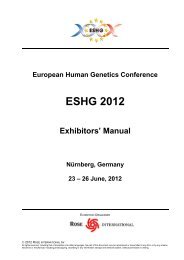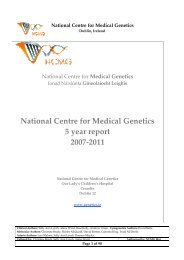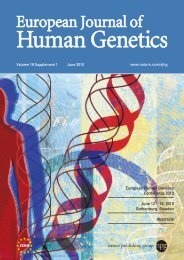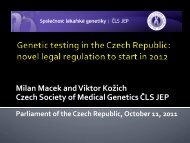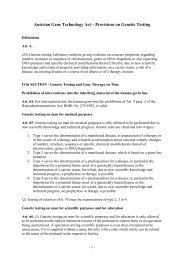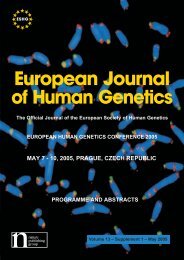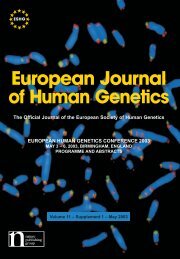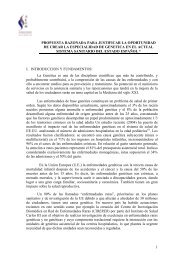2009 Vienna - European Society of Human Genetics
2009 Vienna - European Society of Human Genetics
2009 Vienna - European Society of Human Genetics
You also want an ePaper? Increase the reach of your titles
YUMPU automatically turns print PDFs into web optimized ePapers that Google loves.
Clinical genetics and Dysmorphology<br />
P02.187<br />
Genetic Heterogeneity in Rett syndrome: molecular and clinical<br />
characterization <strong>of</strong> Females Heterozygous for Deleterious<br />
mutations in CDKL and FOXG<br />
L. Lambert 1 , C. Nemos 2 , D. Amsallem 3 , C. Francannet 4 , F. Giuliano 5 , B. Doray 6 ,<br />
A. Roubertie 7 , A. Goldenberg 8 , B. Delobel 9 , V. Layet 10 , M. N´Guyen 11 , A. Saunier<br />
2 , F. Verneau 2 , P. Jonveaux 2 , C. Philippe 2 ;<br />
1 Service de Médecine Infantile I, Centre Hospitalier et Universitaire, Vandoeuvre<br />
les Nancy, France, 2 Laboratoire de Génétique, Centre Hospitalier et Universitaire,<br />
Vandoeuvre les Nancy, France, 3 Service de Neuropédiatrie, Hôpital St<br />
Jacques, Besançon, France, 4 Service de Génétique Médicale, CHU Hôtel-Dieu,<br />
Clermont-Ferrand, France, 5 Service de Génétique Médicale, CHU Hôpital l’Archet,<br />
Nice, France, 6 Service de Cytogénétique, CHU Hôpital de Hautepierre,<br />
Strasbourg, France, 7 Service de Neuropédiatrie, CHU Hôpital Guy de Chauliac,<br />
Toulouse, France, 8 Unité de Génétique Clinique, CHU Hôpital C. Nicolle,<br />
Rouen, France, 9 Centre de Génétique Chromosomique, Hôpital St Vincent de<br />
Paul, Lille, France, 10 Unité de Génétique, Hôpital Flaubert, Le Havre, France,<br />
11 Département de Pédiatrie, CHU, Grenoble, France.<br />
The CDKL5 and FOXG1 genes have been implicated in the molecular<br />
etiology <strong>of</strong> variant forms <strong>of</strong> Rett syndrome. We screened the CDKL5<br />
gene in a cohort <strong>of</strong> 167 patients with early-onset seizures and 10 girls<br />
with Aicardi syndrome. The screening was negative for all males as<br />
well as for females with Aicardi syndrome, excluding the CDKL5 gene<br />
as a candidate for this neurodevelopmental disorder. We found 11 additional<br />
de novo mutations in CDKL5 in female patients with a high<br />
mutation rate (28%) in females with early-onset seizures and infantile<br />
spasms. In addition, we screened the entire coding sequence <strong>of</strong><br />
FOXG1B in a cohort <strong>of</strong> 35 female patients with a classical or congenital<br />
form <strong>of</strong> RTT and 6 males with neonatal epileptic encephalopathies<br />
or RTT-like phenotypes. We found two female patients to be heterozygous<br />
for nonsense mutations resulting in truncated FoxG1 transcription<br />
factors. One patient is affected by a classic form <strong>of</strong> RTT, whereas<br />
the other patient presents with a congenital variant <strong>of</strong> RTT. These findings<br />
give additional support to the genetic heterogeneity in RTT, and<br />
help to delineate the clinical spectrum in the phenotypes associated<br />
with FOXG1 and CDKL5 mutated alleles.<br />
P02.188<br />
A novel p. Arg970X mutation in the last exon <strong>of</strong> the cDKL5 gene<br />
resulting in a female with Rett syndrome-like features and mild<br />
seizure disorder<br />
S. Psoni 1 , P. J. Willems 2 , E. Kanavakis 1 , A. Mavrou 1 , H. Frissyra 1 , J. Traeger-<br />
Synodinos 1 , C. S<strong>of</strong>okleous 1 , P. Makrythanassis 3 , S. Kitsiou-Tzeli 1 ;<br />
1 Choremio Research Laboratory, Athens, Greece, 2 GENDIA (GENetic DIAgnostic<br />
Network), Antwerp, Belgium, 3 Department <strong>of</strong> Genetic Medicine and Development,<br />
Faculty <strong>of</strong> Medicine, University <strong>of</strong> Geneva, Geneva, Switzerland.<br />
Introduction: Mutations in the CDKL5 (Cyclin-Dependent Kinase-like<br />
5) gene in Xp22 are associated with therapy-resistant seizures and<br />
atypical Rett Syndrome (RS) features in early infancy along with severe<br />
mental retardation. RS is a serious neurodevelopmental disorder<br />
caused by mutations in the MECP2 gene in Xq28. In its classic form<br />
RS mainly affects females who after a relatively normal development<br />
during the first six months <strong>of</strong> life develop a wide spectrum <strong>of</strong> symptoms.<br />
Several atypical forms <strong>of</strong> RS also exist, such as the Hanefeld variant<br />
with early-onset convulsions, suggesting the implication <strong>of</strong> other genes<br />
in the RS phenotype.<br />
Material-Methods: We herein report a 14-year-old female with a RSlike<br />
clinical picture, severe mental retardation, and well-controlled seizures.<br />
Results: MECP2 gene testing was negative, but subsequent<br />
sequencing <strong>of</strong> the CDKL5 gene revealed a novel p.Arg970X (c. 2908<br />
C>T) mutation in the last exon. The truncated protein only misses a<br />
small portion <strong>of</strong> the terminus, which might explain the less severe phenotype.<br />
Conclusion: The study <strong>of</strong> the CDKL5-mutated variable phenotypes as<br />
the one presented here, may possibly contribute to the elucidation <strong>of</strong><br />
the CDKL5 and MECP2-associated overlapping molecular and clinical<br />
pathways.<br />
P02.189<br />
Epileptic encephalopathy in a girl with an interstitial deletion <strong>of</strong><br />
Xp22 comprising promoter and exon 1 <strong>of</strong> the CDKL gene<br />
Y. Fichou1 , N. Bahi-Buisson2 , B. Girard3 , J. Nectoux1 , A. Gautier4 , Y. Saillour1 ,<br />
K. Poirier1 , J. Chelly1 , T. Bienvenu1 ;<br />
1Université Paris Descartes, Institut Cochin, CNRS (UMR8103), Paris, France,<br />
2Service de Neuropédiatrie, Hôpital Necker-Enfants-Malades, Paris, France,<br />
3Laboratoire de Biochimie et Genetique Moleculaire, Hôpital Cochin, Paris,<br />
France, 4Service de Neuropédiatrie, CHU de Nantes, Nantes, France.<br />
We report a two-year-old girl with early onset seizures variant <strong>of</strong> Rett<br />
syndrome with a deletion at Xp22 detected by multiplex ligation-dependent<br />
probe amplification (MLPA) technique. This patient presented<br />
with tonic seizures at seven days <strong>of</strong> life. Subsequently, she developed<br />
infantile spasms at three months and finally refractory myoclonic epilepsy.<br />
She demonstrated severe encephalopathy with hypotonia, deceleration<br />
<strong>of</strong> head growth, with eye gaze but limited eye pursuit, no<br />
language, limited hand use, and intermittent hand stereotypies. This<br />
combination <strong>of</strong> clinical features, suggestive <strong>of</strong> early onset variant <strong>of</strong><br />
Rett syndrome led us to screen the CDKL5 gene. In a first step, screening<br />
<strong>of</strong> the whole coding sequence <strong>of</strong> the CDKL5 gene revealed no<br />
point mutations. In a second step, we searched gross rearrangements<br />
by MLPA and identified a microdeletion affecting both the promoter and<br />
exon 1 in CDKL5. Subsequent analysis on a Nimblegen HD2 microarray<br />
confirmed a deletion <strong>of</strong> approximately 300 kb at Xp22, including<br />
the BEND2, SCML2 and CDKL5 genes. In conclusion, our report suggests<br />
that searching for large rearrangements in CDKL5 should be<br />
considered in girls with early onset seizures and Rett-like features.<br />
P02.190<br />
mEcP2 mutations in Bulgarian Rett syndrome patients<br />
T. Todorov1 , A. Todorova1 , R. Tincheva2 , D. Avdjieva2 , V. Mitev1 ;<br />
1Department <strong>of</strong> Chemistry and Biochemistry, Medical University, S<strong>of</strong>ia, Bulgaria,<br />
2Department <strong>of</strong> Pediatrics, Medical University, S<strong>of</strong>ia, Bulgaria.<br />
Rett syndrome (RTT) is a progressive neurodevelopmental disorder<br />
that occurs almost exclusively in females. It is characterized by arrested<br />
development between 6 and 18 months <strong>of</strong> age (with apparent<br />
normal development before that). The main clinical symptoms are: regression<br />
<strong>of</strong> acquired skills, loss <strong>of</strong> speech, stereotypical movements <strong>of</strong><br />
the hands, microcephaly, seizures, and mental retardation. The typical<br />
form <strong>of</strong> RTT is caused by X-linked dominant mutation in the gene encoding<br />
methyl-CpG-binding protein-2 (MECP2).<br />
In total 21 female patients clinically suspected to be affected by classical<br />
RTT were referred to our laboratory for genetic analysis <strong>of</strong> MECP2<br />
gene. The MECP2 gene was screened for mutations by PCR/direct<br />
sequencing.<br />
In one patient the karyotype analysis showed abnormal result -<br />
46,XX,del(X)(p1.22).<br />
Five <strong>of</strong> the affected girls (23,8%) were proved to have mutations in<br />
MECP2 gene: c.473C->T, p.Thr158Met; c.808C->T, p. Arg270X (detected<br />
in two unrelated patients); c.880C->T, p.Arg294X; c.1157_<br />
1200del44, p.Leu386fs. The detected mutations were all de novo.<br />
All <strong>of</strong> our genetically proved cases were very severely affected: total<br />
loss <strong>of</strong> speech is present in all cases, severe mental retardation, stereotypical<br />
hand movements are present, walking without help is impossible,<br />
seizures are invariably found in the presented girls.<br />
Two <strong>of</strong> our patients were additionally tested for Angelman Syndrome<br />
(AS) by Methylation Sensitive PCR analysis; 5 girls were screened for<br />
mutations along the Cycline-dependent kinase-like 5 (CDKL5) gene<br />
and 10 were analysed by MECP2 MLPA Kit for large deletions/duplications<br />
detection. These additional genetic tests revealed no genetic<br />
changes in analyzed patients.<br />
P02.191<br />
mouse models <strong>of</strong> mecP2 disorders share gene expression<br />
changes in the cerebellum and hypothalamus<br />
S. Ben-Shachar1,2 , M. Chahrour2 , C. Thaller2 , C. A. Shaw2 , H. Y. Zoghbi2 ;<br />
1 2 Tel-Aviv Sourasky Medical Center, Tel-Aviv, Israel, Baylor College <strong>of</strong> Medicine,<br />
Houston, TX, United States.<br />
A group <strong>of</strong> postnatal neurodevelopmental disorders collectively referred<br />
to as MeCP2 disorders are caused by aberrations in the gene<br />
encoding methyl-CpG-binding protein 2 (MECP2). Loss <strong>of</strong> MeCP2<br />
function causes Rett syndrome (RTT), whereas increased copy number<br />
<strong>of</strong> the gene causes MECP2 duplication or triplication syndromes.



